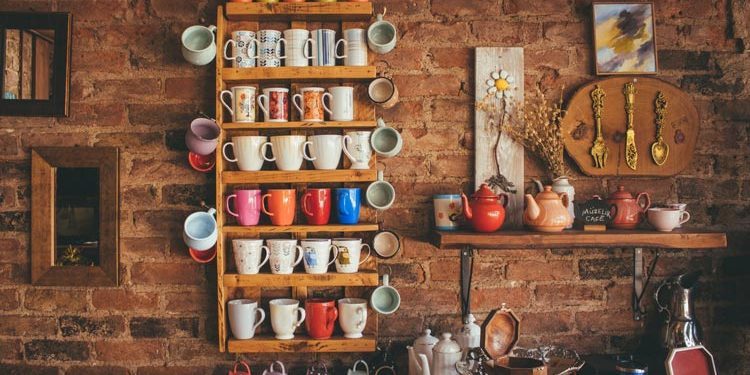“A man’s Self is the sum total of all that he can call his, not only his body and his psychic powers, but his clothes and his house.”
William James
During one of the daily sits recently, I invited participants to bring to mind something that makes them smile. As I was guiding I too did the practice. Afterwards I found myself reflecting on the many events and things in my life that make me smile. I feel a sense of deep gratitude that I can call on any of these throughout my day. The best thing about it is that they are all just a thought away. One of the simplest of these is having a cup of tea in my favourite mug. My daughter bought me this lovely, colourful, hand painted mug when she was on holiday in Poland. It’s by far my favourite mug and when I use it, for some reason, tea tastes so much better. I tend to hug the mug as I am drinking, and it makes me feel good inside when I drink from it.
Years ago I spotted someone else in my family using this particular mug, and I can remember feeling quite irritated. This really surprised me, and I worked hard on letting it go and being happy that someone else was using my mug. At the time it felt like I was being totally irrational. It became something like a guilty secret that no one would possibly understand, until I was on a retreat with friends some years ago. In our group we were encouraged to share things that annoyed us and one of my friends explained that she became irritated when her friend used the mug I had given her for her birthday. At last I had a ‘mug ally’ and I told her I felt the same. We laughed about it. At that point our other friend confessed to feeling the same about her special mug and how cross she felt when her husband drinks from it.
Thankfully, due to the common humanity of being possessive about a mug and a confession shared with close friends, I was able to inquire into what was going on for me and how irritation could set in so quickly. What interested me was the vast contrast in feelings from my mug being the cause of making me smile and yet at the centre of such uncomfortable feelings, which can happen in a heartbeat.
As part of my practice from our Mindfulness Courses I recognised that I had an underlying fear of the mug not being available for my comfort and that I had attached to it. There was a fear of the mug being broken and therefore no longer a source of comfort and joy.
I’m writing this blog drinking tea out of a different mug. When I recall my favourite mug, the pleasant comfort feelings return. Just from the thought. Just like that. The colours make me smile and I can feel a warmth spreading across my chest as I recall drinking from it and the moment my daughter gave it to me.
Apparently, early in childhood we begin developing our relationship with stuff!
Intriguingly, the concept of possessing something develops quite simply in children. Friedman and Neary conducted a study which demonstrated that children subconsciously assume that possessions are an extension of themselves and therefore extra value is placed on them.
Deep emotions can begin to develop relating to possessions such as jealousy if made to share.
Some children have special attachments to objects that bring them comfort – such as a blanket or cuddly toy. Research shows that it appears that children may have a belief that their special toy has an irreplaceable charm – and this can manifest later in life in the way adults treat inherited objects, art, antiques, and things they collect.
So now I understand that I have developed the belief that my special mug has magical powers and has the ability to bring me comfort, so the very thought of it not being there creates a squeezing in my chest that replaces the warmth I felt when I thought of my mug. Cherished items often have an association. This mug serves as a prompt to think of my daughter and provides me with a mindful moment quietly sipping my tea
Apparently, as adults, the more confident we are we begin to associate our identity with our jobs and families rather than possessions. It is then that the need for being attached to certain objects that we possess lessens. This might explain the clear out some of us have from time to time where we let objects that have previously been precious to us go to charity, or even, dare I say it, the dump!
Complicated stuff for just a mug you might think, but this is where my mindfulness practice has led me; to enquire deeply. Then I take every opportunity to take time to notice and understand my habitual behaviours and patterns and therefore have the opportunity to respond in a different way. This ultimately provides the space for me to let go and choose to respond in a different way.
What is more fascinating is that this is all under the power of thought in my mind. The thought of using my mug and the thought of losing my mug created totally different feelings within me. And this is just one small thing in the vastness of little teachers that pop up throughout my life to initiate change.
I dedicate this blog to my dear friends ‘The Mugs’ – you know who you are.
Weekly Challenge
I invite you to sit for a while and then reflect on an object that makes you smile. Notice how the smile feels in your body and the feelings that arise. Now I invite you to bring to mind something that makes you smile but you have a fear of losing. Notice how the contrast feels. Notice the qualities this object has for you and the power of your thought to create different feelings. Soften into the feelings and notice what you learn.
I’d love to hear how you get on. Please do write to me at membership@mindfulnessassociation.net.
How about starting or deepening your mindfulness practice with our Daily Sits?
Warmest wishes
Jacky will be teaching on the new Stillness Through Movement Course on 5th October, 2021.
She has contributed a chapter to the Mindful Heroes Book entitled “Turning Empathic Distress into Compassion – A Hero’s Journey for Family Carers”. You can hear an extract from the chapter where she talks about the results of her MSc Studies in Mindfulness on Compassion & Family Carers. You can download a free sample of Jacky’s chapter here.
Acknowledgments
Friedman, O. & Neary, K.R. (2008). Determining who owns what: Do children infer ownership from first possession? Cognition, 107(3), 829–849.
Hood, B.M. & Bloom, P. (2008). Children prefer certain individuals over perfect duplicates. Cognition, 106(1), 455–462.
Photo by Emre Can from Pexels



